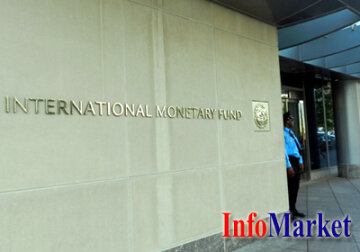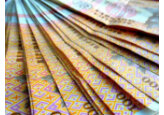
The IMF approved an increase in the amount of financing for Moldova under the current program by $260.11 million to 795.72 million and the immediate allocation of a tranche of $144.81 million to it
According to the International Monetary Fund, the IMF Executive Board completed on May 11 an extraordinary evaluation of the implementation of the program with Moldova, financed by the IMF through the ECF (Extended Credit Facility) and EFF (Extended Financing Facility) lending facilities. Thus, Moldova will immediately receive a tranche of financing in the amount of about $144.81 million (108.15 million special drawing rights). In addition, the IMF Executive Board approved an increase in funding and a redistribution of tranches under the program. Total disbursements for the 40-month ECF and EFF financed facility approved in December 2021 have been increased by $260.11 million (SDR 194.26 million) to $795.72 million (594.26 million SDR). IMF experts note that the consequences of the war in Ukraine affect the Moldovan economy through a variety of channels, including a surge in energy prices, disruptions in trade, an adverse effect on public confidence, and the indirect impact of sanctions. More than 400,000 refugees fleeing the conflict have already crossed the Moldovan border. On a per capita basis, this is the highest rate of any country in the region. Most of the refugees have transited through Moldova and have already left for other countries, but about a quarter of them still remain in the country. Providing immediate access to financing under the ECF and EFF lending facilities will allow Moldova to meet the urgent balance of payments financing needs that emerged in connection with the shocks. At the conclusion of the discussions at the Executive Board meeting, IMF Deputy Executive Director, Commissioner of the meeting, Kenji Okamura, said that the Executive Directors highly appreciated the firm commitment of the Moldovan authorities to the implementation of the IMF-supported program, despite difficult conditions, as well as the prompt actions of the authorities in crisis conditions, and welcomed adoption of budget amendments aimed at protecting vulnerable households, meeting humanitarian needs in the face of an influx of refugees and maintaining social cohesion. At the same time, the Executive Directors emphasized that in the future, strict enforcement of the provisions of the Budget Law, as well as close monitoring of revenue performance and pressure from unplanned spending on the expenditure side, will be important. They stressed that budget planning must continue to be based on a strong commitment to public debt sustainability. Given the unprecedented level of uncertainty, CEOs welcomed the authorities' willingness to implement anti-crisis plans if certain risks materialize. Executive Directors also commended the authorities for meeting program parameters and making significant progress on key reforms, including meeting structural commitments to fiscal management, financial sector oversight, oversight of state-owned enterprises, and strengthening anti-corruption laws. They called for further progress towards the introduction of an integrated register of taxpayers, a comprehensive analysis of tax expenditures and strengthening the institutional autonomy of the National Bank of Moldova. Executive Directors stressed that the program's focus on addressing significant governance weaknesses and institutional vulnerabilities remains critical and welcomed the focus on strengthening the rule of law and financial sector oversight. They noted that the program's ongoing reforms, if properly sequencing and vigorously implemented, will boost productivity, open up opportunities for private investment, and support inclusive and sustainable economic growth. It is noted that the funds provided by the Monetary Fund will allow Moldova to cope with the problems of the war in Ukraine. They will also encourage additional external funding, protect citizens by providing budgetary assistance to the most vulnerable, and promote reforms.// 12.05.2022 — InfoMarket







